Browse the Collection
Browsing 18 items in our archive
Filters: Cameron, Otis, Questionnaires, Curriculum, Folk songs, Greek letter societies Clear filters
-
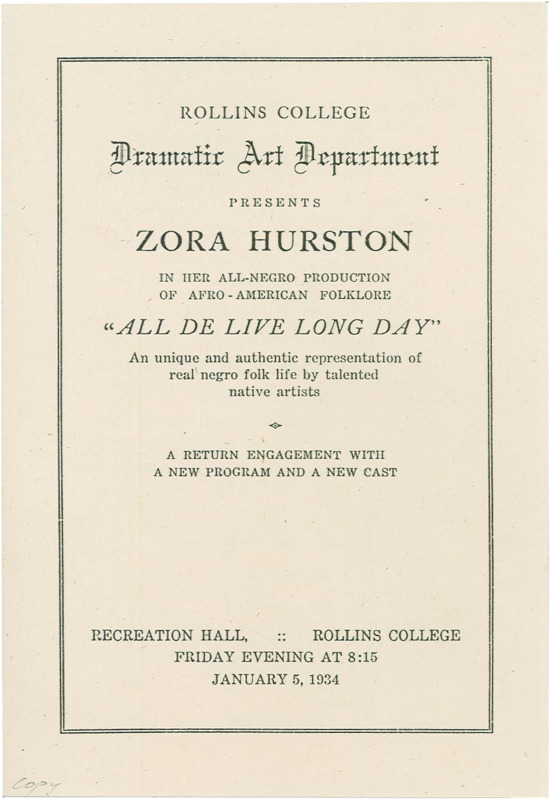 Rollins College | Text
Rollins College | TextAll De Live Long Day Program, 1934
All De Live Long Day, a program of African American folklore, music, and dance, was the second of two productions by Zora Neale Hurston to be performed on the Rollins campus during the 1930s.Learn more -
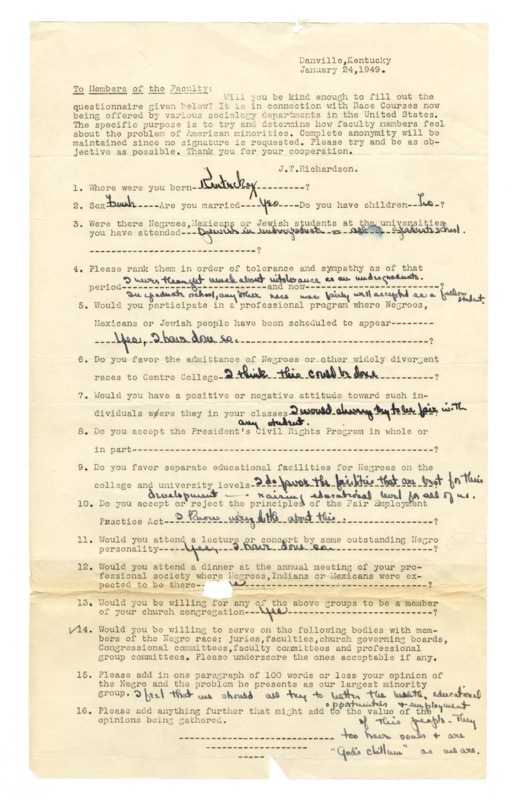 Centre College | Text
Centre College | TextAmerican minorities faculty questionnaire (1)
Anonymous responses to a questionnaire distributed to Centre College faculty January 24, 1949, the stated purpose of which was "to try an determine how faculty members feel about the problem of American minorities."Learn more -
 Centre College | Text
Centre College | TextAmerican minorities faculty questionnaire (10)
Anonymous responses to a questionnaire distributed to Centre College faculty January 24, 1949, the stated purpose of which was "to try an determine how faculty members feel about the problem of American minorities."Learn more -
 Centre College | Text
Centre College | TextAmerican minorities faculty questionnaire (11)
Anonymous responses to a questionnaire distributed to Centre College faculty January 24, 1949, the stated purpose of which was "to try an determine how faculty members feel about the problem of American minorities."Learn more -
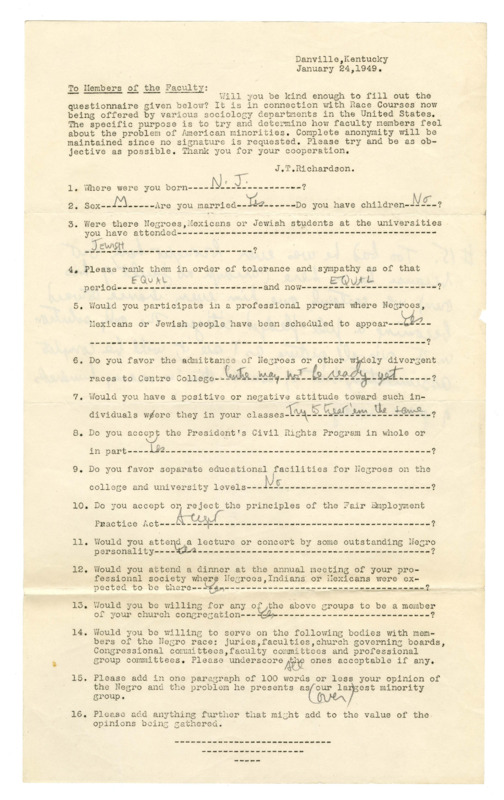 Centre College | Text
Centre College | TextAmerican minorities faculty questionnaire (12)
Anonymous responses to a questionnaire distributed to Centre College faculty January 24, 1949, the stated purpose of which was "to try an determine how faculty members feel about the problem of American minorities."Learn more -
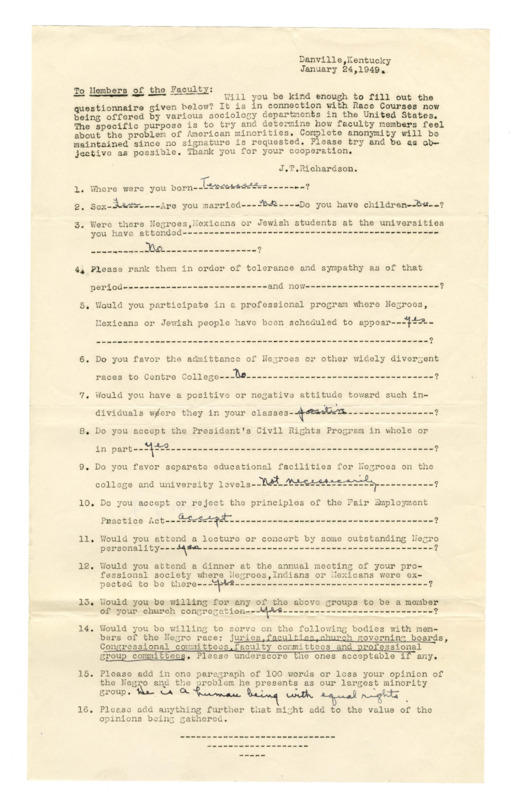 Centre College | Text
Centre College | TextAmerican minorities faculty questionnaire (2)
Anonymous responses to a questionnaire distributed to Centre College faculty January 24, 1949, the stated purpose of which was "to try an determine how faculty members feel about the problem of American minorities."Learn more -
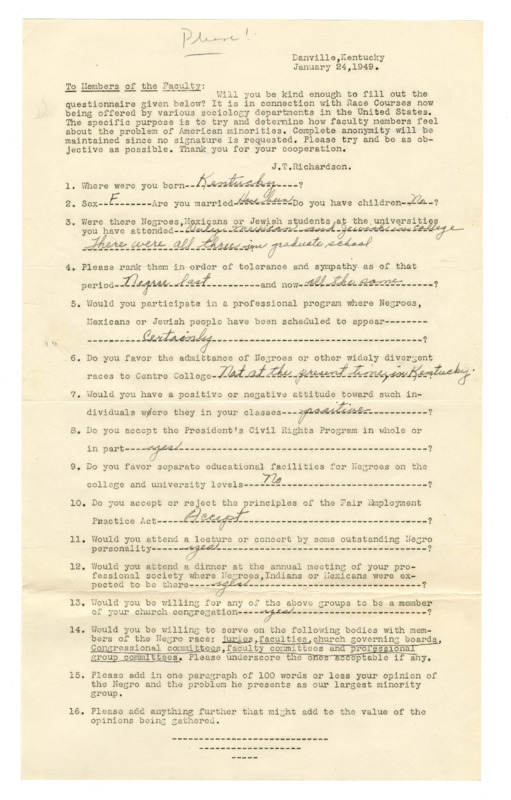 Centre College | Text
Centre College | TextAmerican minorities faculty questionnaire (3)
Anonymous responses to a questionnaire distributed to Centre College faculty January 24, 1949, the stated purpose of which was "to try an determine how faculty members feel about the problem of American minorities."Learn more -
 Centre College | Text
Centre College | TextAmerican minorities faculty questionnaire (4)
Anonymous responses to a questionnaire distributed to Centre College faculty January 24, 1949, the stated purpose of which was "to try an determine how faculty members feel about the problem of American minorities."Learn more -
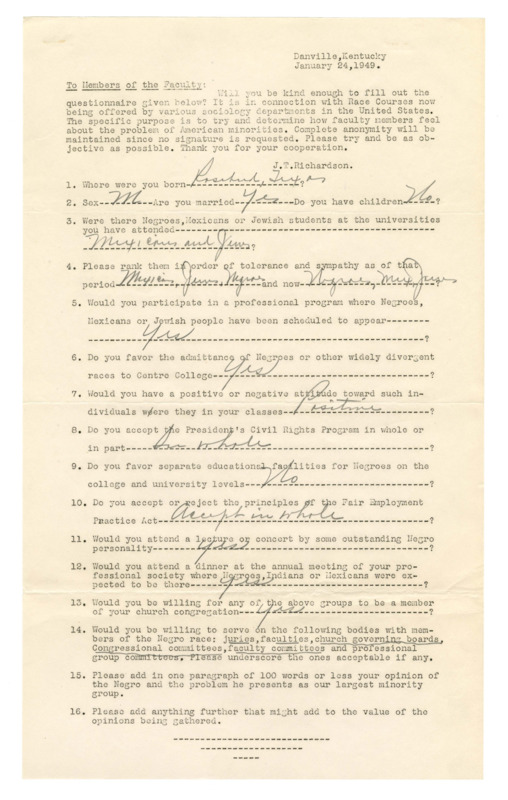 Centre College | Text
Centre College | TextAmerican minorities faculty questionnaire (5)
Anonymous responses to a questionnaire distributed to Centre College faculty January 24, 1949, the stated purpose of which was "to try an determine how faculty members feel about the problem of American minorities."Learn more -
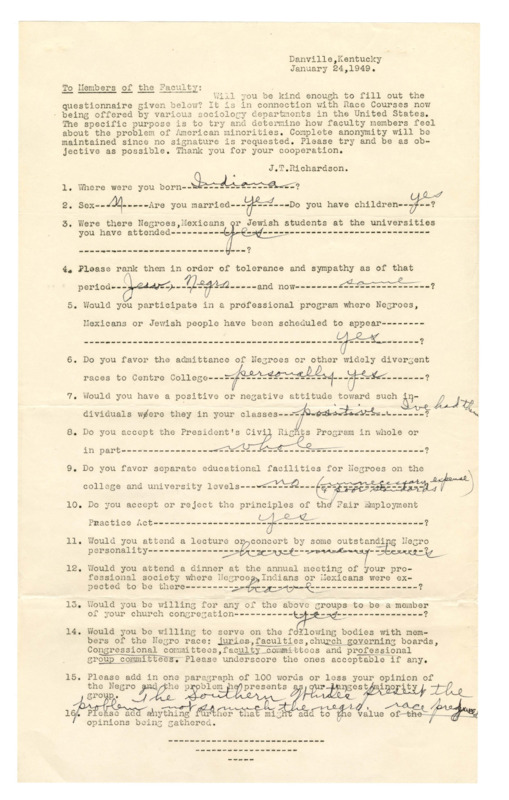 Centre College | Text
Centre College | TextAmerican minorities faculty questionnaire (6)
Anonymous responses to a questionnaire distributed to Centre College faculty January 24, 1949, the stated purpose of which was "to try an determine how faculty members feel about the problem of American minorities."Learn more -
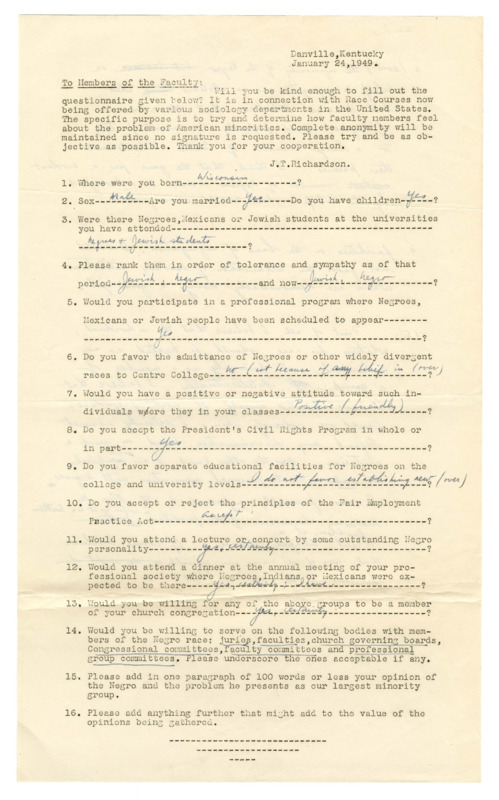 Centre College | Text
Centre College | TextAmerican minorities faculty questionnaire (7)
Anonymous responses to a questionnaire distributed to Centre College faculty January 24, 1949, the stated purpose of which was "to try an determine how faculty members feel about the problem of American minorities."Learn more -
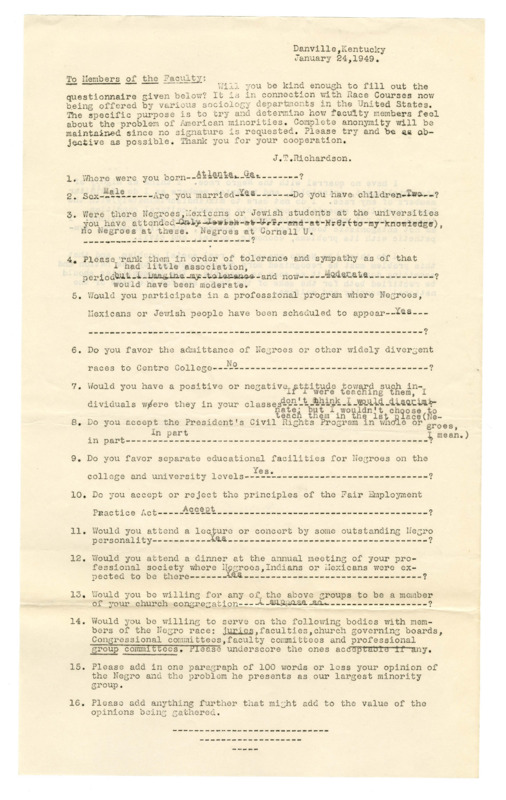 Centre College | Text
Centre College | TextAmerican minorities faculty questionnaire (8)
Anonymous responses to a questionnaire distributed to Centre College faculty January 24, 1949, the stated purpose of which was "to try an determine how faculty members feel about the problem of American minorities."Learn more -
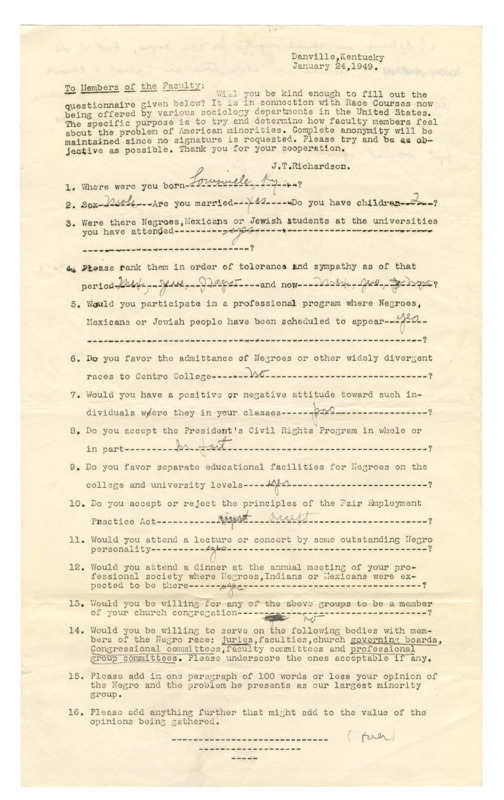 Centre College | Text
Centre College | TextAmerican minorities faculty questionnaire (9)
Anonymous responses to a questionnaire distributed to Centre College faculty January 24, 1949, the stated purpose of which was "to try an determine how faculty members feel about the problem of American minorities."Learn more -
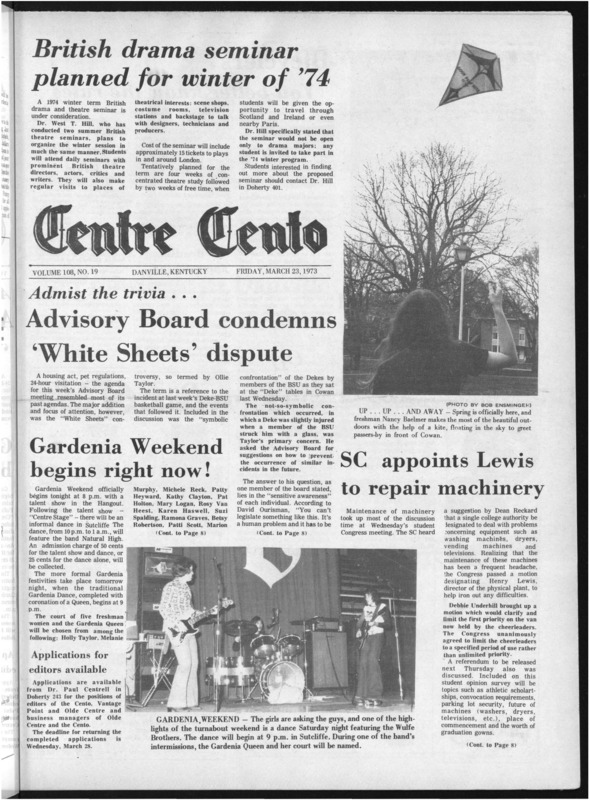 Centre College | Text
Centre College | TextAmidst the Trivia...Advisory Board Condems ‘White Sheets’ Dispute
Reporting on the Advisory Board meeting, during which was discussed, among other things (including the Yerkes lounge to be used by the BSU), the incident involving the Dekes wearing white sheets at the BSU basketball game, and ensuing confrontation between Dekes and members of the BSU at Cowan which resulted in a member of the Deke fraternity being injured after being struck by a glass by a member of the BSU.Learn more -
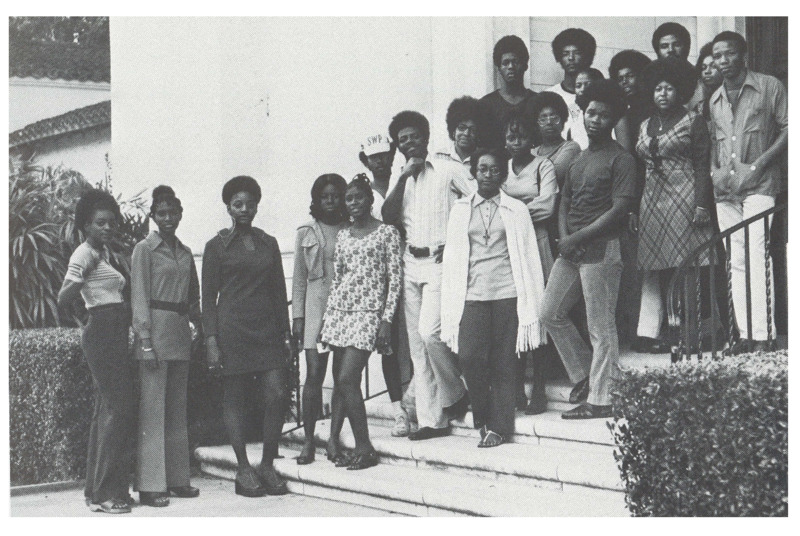 Rollins College | Image
Rollins College | ImageBlack Student Union, 1972-1973
Twenty Black Student Union members pose for their student organization’s yearbook photograph. This is the first Black Student Union photograph included in the Tomokan yearbook. Back row: Krisita Jackson, Theda James, Deborah Coleman, Brenda Martin, Reggie Brock, Blanche Jackson, Lonnie Butler, Otis Cameron, Rodney Dowling. Middle row: Lorraine Powell, Marcus Wilson, Grace Borom, Juanita Gibson, Jennifer Matthews, Roxwell Robinson, Arlinda Staley. Front row: Guilda Brandon, Theotis Bronson, Constance Blackman, Errol Cunningham.Learn more -
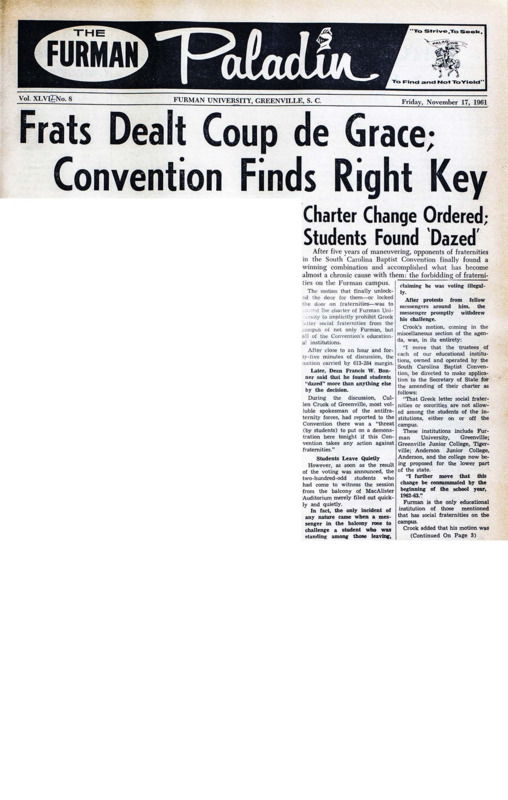 Furman University | Text
Furman University | TextCharter Change Ordered: Students Found Dazed
An article appearing in Furman's student newspaper, The Paladin, dated November 11, 1961, describing, in detail, a meeting of the South Carolina Baptist Convention where the members voted to amend the charter of Furman University to prohibit Greek letter social fraternities from the campus of Furman, as well as all of the Convention's educational institutions.Learn more -
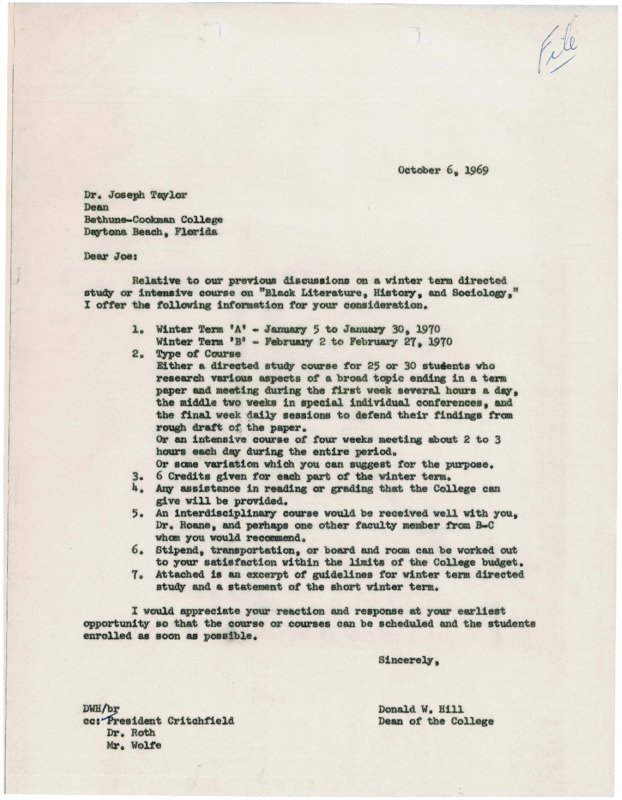 Rollins College | Text
Rollins College | TextLetter from Donald W. Hill to Joseph Taylor, 1969
The administration responds to student demands for more Black studies by creating a winter term course on "Black Literature, History and Sociology." The Dean of Rollins College consulted the Dean of Bethune-Cookman College on the structure and content of the course, demonstrating continued cooperation between the two institutions.Learn more -
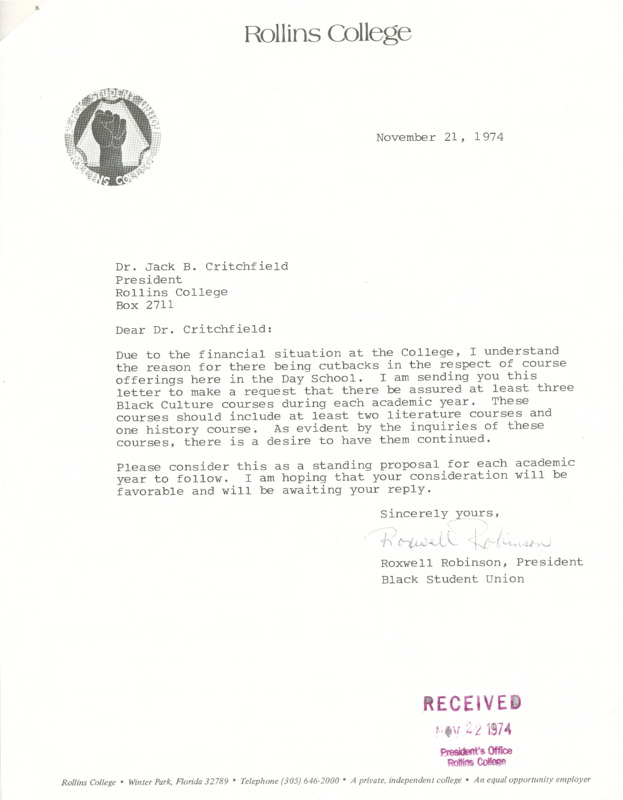 Rollins College | Text
Rollins College | TextRoxwell Robinson and Jack B. Critchfield Correspondence, 1974
Black Student Union President Roxwell Robinson writes to President Jack Critchfield, requesting that the College offer at least three Black Culture courses per academic year, even in the face of financial difficulty. President Critchfield responds that he cannot make a guarantee, but that he and the administration intend to preserve Black Culture courses in the curriculum.Learn more
